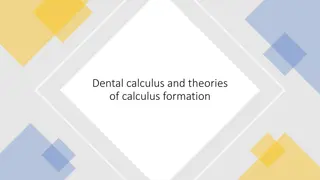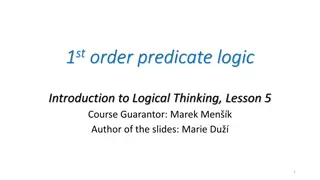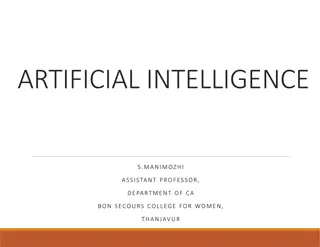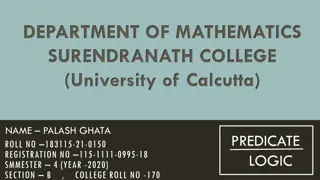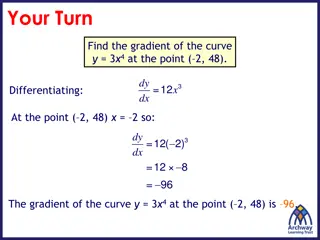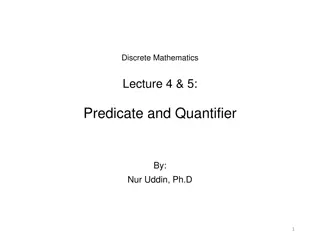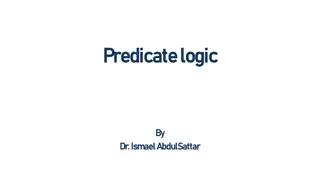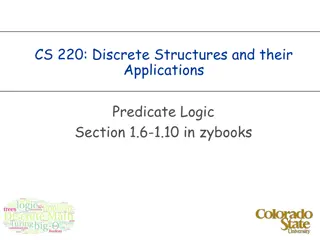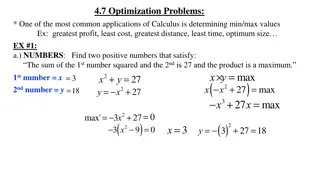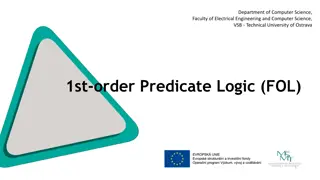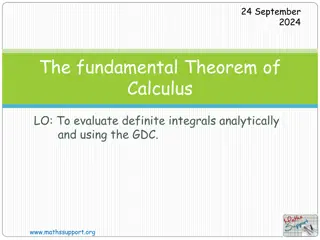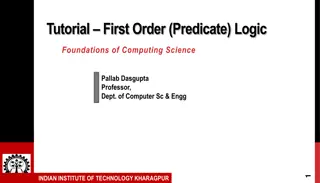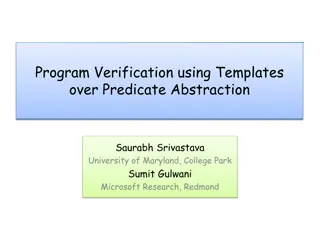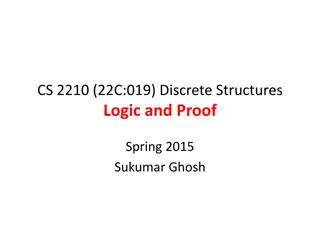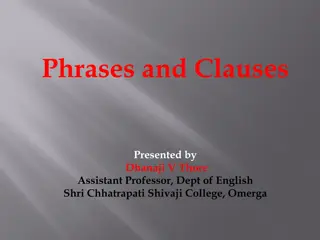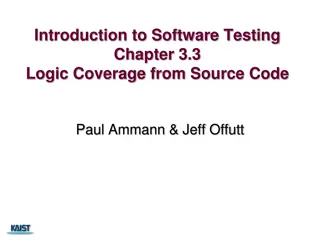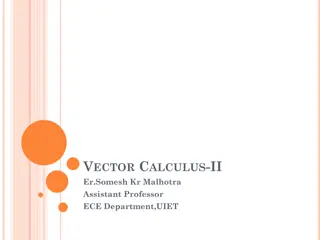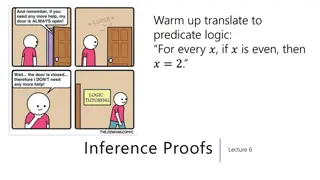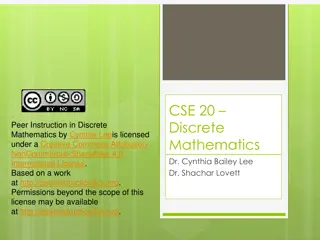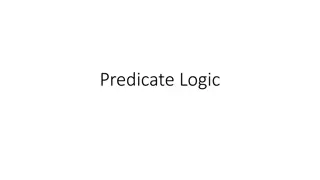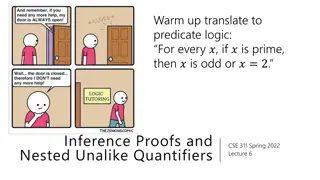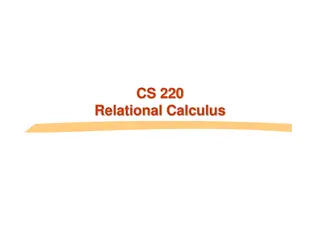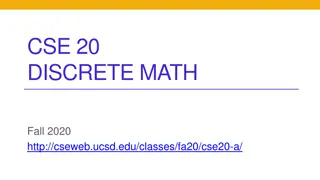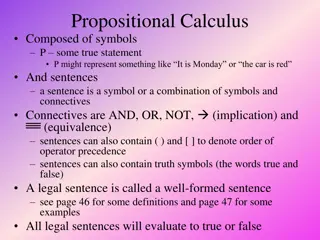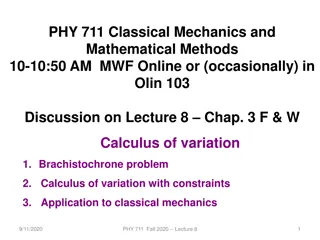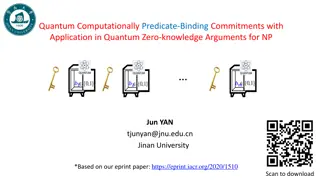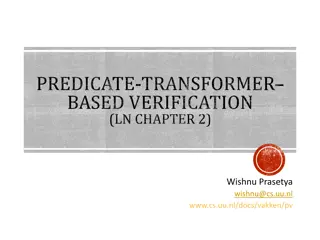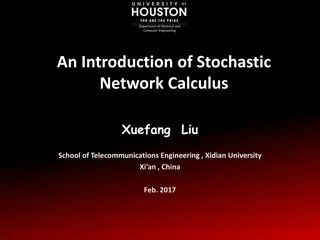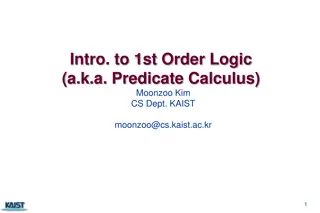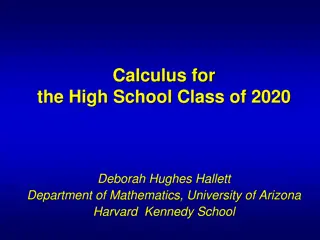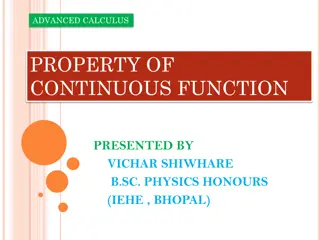Dental Calculus Formation and Classification
Dental calculus, also known as tartar, is a mineralized bacterial plaque that forms on natural teeth and dental prostheses. It can be classified as supragingival or subgingival based on its relation to the gingival margin. This hard deposit is formed through the mineralization of dental plaque and c
5 views • 36 slides
Introduction to 1st Order Predicate Logic in Logical Thinking
Explore the limitations of propositional logic and the enhanced expressive power of 1st order predicate logic (PL1). Understand how PL1 allows for analyzing the structure of atomic propositions and proving arguments that depend on these structures. Through examples and valid argument schemata, delve
1 views • 26 slides
Predicate Logic in Artificial Intelligence
In the world of artificial intelligence, predicate logic plays a crucial role in representing simple facts. It involves syntax, semantics, and inference procedures to determine the truth value of statements. Real-world facts are represented using propositions in logic, allowing for structured knowle
1 views • 19 slides
Linking Verbs and Predicate Words in English Grammar
Linking verbs connect the subject of a sentence with a predicate word, while predicate words follow a linking verb to identify, rename, or describe the subject. Learn about sentence patterns, forms of linking verbs, and how to differentiate between linking and action verbs. Understand the role of pr
3 views • 31 slides
Introduction to Predicate Logic in Mathematics
Predicate logic is a powerful tool used in mathematics to express complex relationships and assertions that cannot be adequately represented by propositional logic. It allows for the quantification of statements over a range of elements using predicates and quantifiers like universal and existential
3 views • 13 slides
Calculus Examples and Practice
Explore various calculus problems involving finding gradients, equations of tangents and normals, and analyzing curves. Practice determining gradients at specific points, solving for coordinates, and differentiating equations to find tangent and normal lines. Understand the relationship between grad
2 views • 11 slides
Introduction to Predicate Logic and Quantifiers in Discrete Mathematics
In this lecture series by Dr. Nur Uddin, we delve into the limitations of propositional logic and the introduction of predicate logic as a more powerful tool for expressing statements in mathematics and computer science. Learn about predicates, quantifiers, and how to reason and explore relationship
7 views • 13 slides
Predicate Calculus: Symbols, Terms, and Variables
Predicate calculus extends propositional calculus by introducing symbols like truth values, constants, variables, and functions. It allows for precise manipulation of components within assertions, enabling the creation of general statements about classes of entities. Learn how predicates define rela
3 views • 14 slides
Predicate Logic: From Propositional to Predicate Logic
Transitioning from propositional to predicate logic allows reasoning about statements with variables without assigning specific values to them. Predicates are logical statements dependent on variables, with truth values based on those variables. Explore domains, truth values, and practical applicati
0 views • 34 slides
Applications of Calculus in Optimization Problems
Calculus plays a crucial role in solving optimization problems to find maximum or minimum values in various real-life scenarios. This content provides examples of optimizing for maximum profit, area, distance, and volume using calculus concepts. From finding optimal dimensions for fencing to maximiz
0 views • 10 slides
Calculus: From MVT to FTC with Lin McMullin
Join Lin McMullin in exploring the transition from the Mean Value Theorem (MVT) to the Fundamental Theorem of Calculus (FTC). Discover the significance of MVT, Fermat's Theorem, Rolle's Theorem, and the Mean Value Theorem, all crucial concepts in calculus. Engage in graphical explorations, proving m
0 views • 45 slides
First-Order Predicate Logic in Computer Science Education
Exploring the concepts of first-order predicate logic in computer science, this content delves into the formal language, grammar, and logical form of arguments. It covers the importance of moving beyond propositional logic, introduces valid schemata, and illustrates the structure of atomic and compo
1 views • 23 slides
The Fundamental Theorem of Calculus
Explore the connection between differential calculus and the definite integral through the fundamental theorem of calculus, which allows for the evaluation of complex summations. Discover the properties of definite integrals and how to apply the theorem to find areas under curves. Practice evaluatin
0 views • 15 slides
Predicate Logic Problems and Solutions
Explore various scenarios and challenges in predicate logic, from converting statements to normal form to reasoning using predicate logic. Dive into encoding sentences in first-order logic, understanding FOL formulas, and formalizing sentences with FOL formulas.
3 views • 7 slides
Program Verification Using Templates Over Predicate Abstraction
This research explores a technique that allows for inferring invariants with arbitrary quantification and boolean structure, improving the state-of-the-art in program verification. It can infer weakest preconditions, helping with debugging and analysis by discovering worst-case inputs and missing pr
1 views • 32 slides
Predicate Logic in Discrete Structures
Explore the nuances of predicate logic in discrete structures, which go beyond the limitations of propositional logic. Learn about predicates, quantifiers, and how to negate quantifications. Dive into examples and understand how to translate logical statements into English effectively.
3 views • 45 slides
Phrases and Clauses in English Grammar
This content dives into the concepts of phrases and clauses in English grammar, presented by Assistant Professor Dhanaji V. Thore. It explains how a phrase is a group of related words lacking a subject and predicate, while a clause contains both a subject and a predicate to form a complete sentence.
1 views • 23 slides
Logic Coverage in Software Testing
Logic coverage from source code involves deriving predicates from decision statements in programs, where most predicates have less than four clauses. Wise programmers aim to keep predicates simple, as they affect coverage criteria such as COC, ACC, ICC, and CC, which collapse to predicate coverage (
0 views • 11 slides
Vector Calculus II Concepts with Examples by Prof. Somesh Kr. Malhotra
Explore advanced topics in vector calculus including gradient, divergence, curl, and theorems like the Divergence Theorem and Stokes' Theorem. Follow along with examples presented in Cartesian, spherical, and cylindrical coordinates to deepen your understanding of vector calculus concepts.
0 views • 29 slides
Predicate Logic and Quantifiers for Symbolic Proofs
Dive into the realm of predicate logic and quantifiers, exploring the nuances of symbolic proofs and evaluating logical statements. Learn about bound variables, domain considerations, and strategies for constructing iron-clad proofs using quantifiers.
0 views • 36 slides
Peer Instruction in Discrete Mathematics Overview
Explore the fundamentals of discrete mathematics through Predicate Quantifiers, Paradoxes, and Proof Strategies in Peer Instruction. Gain insights on Predicate Love examples and strategies for proving or disproving quantified statements. Enhance your understanding of nested quantifiers and predicate
0 views • 10 slides
Predicate Logic and Quantifiers
Predicate logic extends propositional logic by allowing statements to be assigned specific values. The limitations of propositional logic are overcome through predicate logic, where statements like "?. is greater than 3" have subject and predicate parts denoted as ?(?). Furthermore, predicates can b
2 views • 20 slides
Predicate Logic and Proofs in CSE 311
Explore the translation of statements into predicate logic, learn about inference proofs and nested quantifiers, and delve into the application of logical thinking in real-world scenarios. Discover a new way of constructing proofs and understand notation laws of inference. Engage in interactive proo
0 views • 37 slides
Introduction to Relational Calculus and Algebra in Database Management
Explore the fundamental concepts of relational calculus and algebra in the domain of database management. Understand the differences between declarative and imperative query languages and learn to retrieve information using practical examples and theoretical frameworks such as tuple relational calcu
0 views • 23 slides
Predicate Logic in Discrete Mathematics
Explore the concepts of predicates, truth values, quantified statements, and DeMorgan's law in discrete mathematics. Learn how to define, evaluate, and apply predicates using tables, functions, and truth sets. Dive into universal and existential statements, counterexamples, and witness-based argumen
2 views • 14 slides
Propositional Calculus
Propositional calculus involves symbols representing true statements like "It is Monday" or "the car is red." Learn about connectives, semantics, and data-driven reasoning within this logical system. Predicate calculus expands on propositions by incorporating relationships between entities through p
0 views • 19 slides
Presented to you By:
Dive into essential strategies for conquering calculus anxiety, understanding derivative notation, and mastering key mathematical concepts. Explore practical tips and examples to enhance your skills and boost confidence in calculus. Overcome nervousness and confusion with expert guidance on function
0 views • 15 slides
Classical Mechanics and Mathematical Methods: Lecture 8 - Calculus of Variation
This content provides information on Lecture 8 focusing on the calculus of variation, including topics like the Brachistochrone problem, calculus of variation with constraints, and its applications in classical mechanics. Questions from students are addressed regarding assignments, integral equation
0 views • 33 slides
Applied Fractional Calculus Workshop Series
In this workshop series, delve into the realm of fractional calculus at the MESA Lab, UC Merced. Gain insights on research interests, achievements, and current focus, along with near-term goals. Explore the significance of fractional calculus and its applications in Mechatronics, Embedded Systems, a
0 views • 5 slides
Quantum Computationally Predicate-Binding Commitments
Quantum Computationally Predicate-Binding Commitments play a crucial role in Quantum Zero-Knowledge Arguments for NP. The concept involves Quantum Bit Commitment and Computational Binding in a quantum setting, exploring the uniqueness and superposition of committed values. This work introduces new r
0 views • 24 slides
Exploring Logical Theories in Computability
In this topic, we delve into logical theories and their relationship with Turing machines, focusing on the decidability of mathematical statements. We analyze examples of logical statements within the context of first-order logic, also known as predicate logic or predicate calculus.
0 views • 22 slides
Predicate Transformer Based Verification Overview
Explore the concept of Predicate Transformer Based Verification in this comprehensive guide covering topics like Hoare Logic, Hoare Triples, Specifying Programs, and more. Learn how to mechanically verify real programs using Predicate Transformers and Guarded Command Language.
0 views • 68 slides
Introduction to Stochastic Network Calculus in Electrical and Computer Engineering
Explore the world of Stochastic Network Calculus in the Department of Electrical and Computer Engineering at Xidian University. Learn about Network Calculus, Queueing Theory, and the foundations laid by R. Cruz. Discover how Deterministic and Stochastic Network Calculus provide different levels of s
0 views • 43 slides
Predicate Logic Fundamentals: Introduction & Examples
Explore the basics of Predicate Logic including variables, predicates, quantifiers, and propositional functions. Learn how to translate between English and Predicate Logic and evaluate truth values using examples.
1 views • 57 slides
Exploring the Origin of Subject-Predicate Structure in Thought
Delve into the origin and development of subject-predicate structure in thought processes, examining its relationship to human language faculties and logical frameworks. Join Paul M. Pietroski from the University of Maryland as he discusses the systematicity of thoughts and propositions, shedding li
1 views • 18 slides
Introduction to Predicate Calculus and First-Order Logic Explained
Explore the finer logical structure of sentences beyond propositional logic with predicate calculus and first-order logic. Learn how to reason about sentences dealing with modifiers and infinite domains using examples and definitions.
0 views • 16 slides
Calculus Preparation and Algebra Mastery for Science and Engineering
Discover the essential role of calculus in science and engineering education, emphasizing the significance of solid algebra preparation. Learn what it takes to excel in calculus and the background required for success. Gain insights from notable reports and examples to enhance your understanding and
0 views • 42 slides
Understanding the Properties of Continuous Functions in Advanced Calculus
Explore the key concepts in advanced calculus including the conditions and properties of continuous functions as presented by Vichar Shiwahre. Learn about continuity, Cauchy's definition, Borel's theorem, boundedness, the Mostest theorem, and more. Dive into the fascinating world of calculus with th
0 views • 22 slides
Understanding Extrema and First Derivative Test in Calculus
Explore the concept of extrema and the First Derivative Test in Calculus through examples and explanations. Learn about absolute maxima and minima, local maxima and minima, and the importance of algebraic accuracy. Develop a comprehensive understanding of finding extreme values and applying derivati
0 views • 27 slides
Understanding Antiderivatives in Calculus
Learn about antiderivatives in calculus, their importance in various fields, and how to find antiderivatives of functions. Discover the concept of anti-differentiation and examples to deepen your understanding of calculus concepts.
0 views • 8 slides
